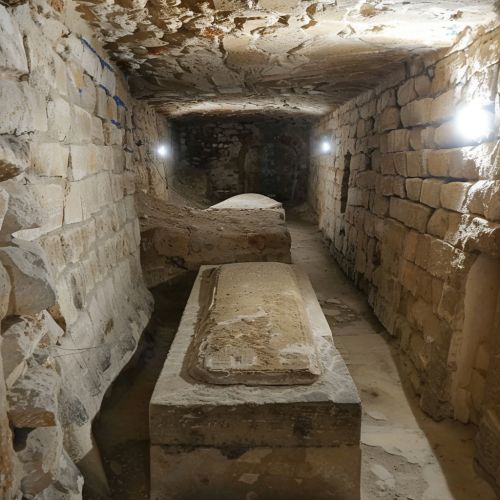Abgar V
Early Life and Ascension to the Throne
Abgar V, also known as Abgar the Black or Abgar Ukkāmā, was the King of Osroene Kingdom from 4 BC to AD 7 and AD 13 to 50. He was born into the Abgarid dynasty, a ruling family of the small kingdom located in the region of Mesopotamia. The kingdom's capital, Edessa, was a significant political and cultural center during his reign.


Abgar V's early life remains largely undocumented, but it is known that he ascended to the throne following the death of his father, King Ma'nu. His reign was marked by political maneuvering between the two major powers of the time, the Roman and Parthian empires.
Reign and Political Maneuvering
Throughout his reign, Abgar V managed to maintain a degree of independence for his kingdom by skillfully playing the Romans and Parthians against each other. This was a delicate balancing act, as Osroene was a buffer state between these two empires. Abgar V's political acumen allowed him to navigate these complex relationships and maintain his kingdom's autonomy.
In AD 7, Abgar V was deposed by the Roman Emperor Augustus due to his suspected collaboration with the Parthians. However, he was restored to the throne in AD 13 after proving his loyalty to Rome. During his second reign, Abgar V continued his policy of maintaining a delicate balance between the two superpowers.
Abgar V and Christianity
Abgar V is perhaps best known for his supposed correspondence with Jesus. According to the Doctrine of Addai, a Syriac Christian text, Abgar V, suffering from an incurable illness, heard of Jesus' miracles and sent a letter to him, inviting him to Edessa and promising to protect him from his enemies. In response, Jesus allegedly wrote a letter, promising to send one of his disciples to heal Abgar after his ascension.
While this story is largely considered apocryphal by modern historians, it played a significant role in establishing Edessa as an early center of Christianity. The letters, whether real or forged, helped to legitimize the Christian faith in the region and contributed to the spread of Christianity in Mesopotamia.
Death and Legacy
Abgar V died in AD 50, leaving a significant legacy. His successful navigation of the political landscape of the time allowed his kingdom to maintain its independence in the face of two powerful empires. His supposed correspondence with Jesus also left a lasting impact on the religious landscape of the region.


Following his death, Abgar V was succeeded by his son, Ma'nu VI. The Abgarid dynasty continued to rule Osroene until AD 213, when the kingdom was finally absorbed into the Roman Empire.
